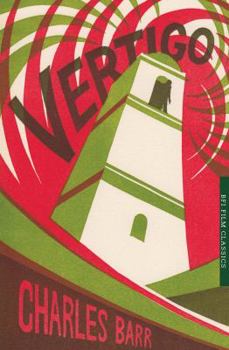Book Overview
Vertigo (1958) is widely regarded as not only one of Hitchcock's best films, but one of the greatest films of world cinema. Made at the time when the old studio system was breaking up, it functions both as an embodiment of the supremely seductive visual pleasures that 'classical Hollywood' could offer and - with the help of an elaborate plot twist - as a laying bare of their dangerous dark side. The film's core is a study in romantic obsession, as James Stewart's Scottie pursues Madeleine/Judy (Kim Novak) to her death in a remote Californian mission. Novak is ice cool but vulnerable, Stewart - in the darkest role of his career - genial on the surface but damaged within. Although it can be seen as Hitchcock's most personal film, Charles Barr argues that, like Citizen Kane, Vertigo is at the same time a triumph not so much of individual authorship as of creative collaboration. He highlights the crucial role of screenwriters Alec Coppel and Samuel Taylor and, by a combination of textual and contextual analysis, explores the reasons why Vertigo continues to inspire such fascination. In his foreword to this special edition, published to celebrate the 20th anniversary of the BFI Film Classics series, Barr looks afresh at Vertigo alongside the recently-rediscovered 'lost' silent The White Shadow (1924), scripted by Hitchcock, which also features the trope of the double, and at the acclaimed contemporary silent film The Artist (2011), which pays explicit homage to Vertigo in its soundtrack.
Format:Paperback
Language:English
ISBN:1844574989
ISBN13:9781844574988
Release Date:September 2012
Publisher:British Film Institute
Length:104 Pages
Weight:0.45 lbs.
Dimensions:0.3" x 6.0" x 8.0"
Customer Reviews
2 ratings
Vertigo
Published by Thriftbooks.com User , 18 years ago
This is one of a series on classic movies put out by the British Film Institute, and I guess Alfred Hitchcock qualifies because he began as an English director, even though Vertigo was made in Hollywood...Anyway, like all of the BFI series I have read, this one is a little gem (almost as good as Camille Paglia's essay on The Birds). If you are a Hitchcock fan -- if you love movies, especially suspense thrillers -- if you think Vertigo is one of the best movies ever made (like me), you will devour this little book the way a chocolate lover gobbles up a box of Godiva truffles. Everything you ever wanted to know and more about Vertigo. Well, almost. My only complaint is that it isn't long enough.
Experience Vertigo at New Heights!
Published by Thriftbooks.com User , 19 years ago
Although I have always enjoyed the movie Vertigo, it was never on my list of favorite Hitchcock movies, preferring North By Northwest and Rear Window even more. Charles Barr's book VERTIGO may not have changed my opinion but it certainly allows me to understand why someone else would disagree with my personal ranking. The book explores Vertigo on several different levels allowing for a richer appreciation of the movie. As Barr notes, Vertigo is unlike many other Hitchcock movies in that it is more about the relationship of the characters played by Jimmy Stewart and Kim Novak than it is about the criminal plot. In fact, again unusual for Hitchcock movies, the plot twist, the scheme by which murder has been committed, is revealed not at the end of the movie but rather about two-thirds of the way into it. This allows the remaining forty or so minutes to focus on the interactions between the characters. That Novak is playing a dual role and all the characters are working with different levels of knowledge at different times makes this all the more interesting. One part of VERTIGO that I find fascinating is the theory that Jimmy Stewart actually dies at the beginning of the film after hanging from the rooftop. The viewer never sees him rescued and therefore, so the thought goes, everything that follows (basically the whole movie) takes place in his head while hanging, falling and dying. Usually I do not go for such metaphysical theories unless there is a solid basis of support. Here there is. Barr introduces the reader to the author Ambrose Bierce who wrote a story using the same plot device. Clues of Bierce's presence are placed throughout the movie and one of the screenwriters made an elliptical, though nonetheless explicit, reference to Bierce with respect to the story. Although this theory of Stewart's death at the beginning of Vertigo may be a minority opinion, it is nonetheless valid and quite interesting. Film criticism being what it is, Barr throws in a number of phrases that come off as hoity-toity. But I never had the feeling that he was speaking down to the reader. The British Film Institute guides are usually fairly well written and informative and VERTIGO is no exception.






